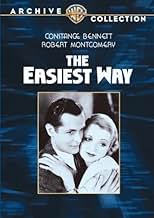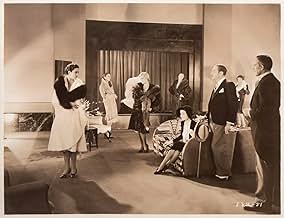Ajouter une intrigue dans votre langueLaura from a poor family rejects her boyfriend for a wealthy older man. She falls for a younger journalist, leaves the wealthy man but struggles financially.Laura from a poor family rejects her boyfriend for a wealthy older man. She falls for a younger journalist, leaves the wealthy man but struggles financially.Laura from a poor family rejects her boyfriend for a wealthy older man. She falls for a younger journalist, leaves the wealthy man but struggles financially.
- Réalisation
- Scénario
- Casting principal
- Récompenses
- 1 victoire au total
- Hotel Clerk
- (non crédité)
- Brockton Associate
- (non crédité)
- Women at Cook-Out
- (non crédité)
- Andy Murdock
- (non crédité)
- Chris Swoboda - Laura's Suitor
- (non crédité)
- Bud Williams
- (non crédité)
- Mrs. Clara Williams
- (non crédité)
- Mr. Gensler
- (non crédité)
- Tillie Murdock
- (non crédité)
- Alfred - Brockton's Butler
- (non crédité)
Avis à la une
This is a pre-Code film, but it's a mixed bag relative to moralistic messaging, and that was a little frustrating. Its premise is born out of the Depression, and it being tough for working families to make ends meet. In a common theme from the era, a sudden event promises a change in fortune: the meeting of a rich man. It comes at a cost, however, and "the easiest way" out of one's problems is soon shown to be the hard way.
We initially meet a large family in an early morning scene that was sharp and full of life. Kids of all ages sharing beds are being awakened by their mother and sent on errands or called to get their breakfast. The father announces he is tired of the physical strain of working as a longshoreman and wants to rely on his kids, so he would like his adolescent son to drop out of school so that he can get a job at a construction site catching red-hot rivets thrown by workers in a pail. Yikes. We're not in 2023 here, we're in 1931 - although in light of Iowa and other state legislatures moving forward with loosening child labor laws with little ability to hold businesses accountable in the event of injury or death, hey, perhaps we're also looking at the future here! But I digress. One of his adult daughters (Anita Page) is soon to marry a hard-working blue-collar guy (Clark Gable). The other (Constance Bennett) is a sensible saleswoman, but after being discovered as a modelling prospect, becomes the lover of the top boss (Adolphe Menjou). Her sugar daddy allows her to live a life of luxury and support her family, but the immorality of the relationship (as seen in the eyes of the era) causes her to be ostracized by her mother and brother-in-law, and she's conflicted when she meets someone she truly loves (Robert Montgomery).
It's a fantastic cast with all five of those actors, and these were early roles for Montgomery and Gable, which is a bonus. Director Jack Conway keeps things moving along with great pace as well, and occasionally there are some fine shots, such as the one of Bennett and Montgomery talking at a mountain lake, their backs turned to the camera and the reflection of the trees in the water in the background. We never really see any passion between Bennett and Menjou so it's decidedly tame for a pre-Code film, and that's almost certainly due to censors taking exception to Bennett's life being shown as too alluring before eventually getting to its message and hacking it up at a local level, as Mark Viera describes in Forbidden Hollywood. The film also vacillates melodramatically as it plays out. I liked that part of this showed the position Bennett's character was in, between a rock and a hard place, with her friend saying that the men "held all the trumps," but wish it had taken more of a stand on this hypocrisy.
And that's where most of my discontent came from, the judgment of Bennett's character, while there was absolutely none of this for Menjou's. The most visible form of this comes from Clark Gable's character, who clearly represents the film's moral compass, given the somewhat nauseating forgiveness scene, complete with Christmas trappings, at the end. Even Bennett herself feels she is wrong to be living with a man who is "not the marrying kind," and comes off as more miserable than some of the other strong pre-Code characters and the leading ladies who played them. At least she's not condemned to death so this doesn't feel completely like a post-Code film, but it's close.
Laura (Constance Bennett) lives in a crowded apartment with her trashy family. They're poor and the father is a genial drunk. Because of this background, it's not at all surprising that when she is given a chance to become her boss' mistress, she jumps at the chance. After all, he's loaded and pampers her like she's never been pampered before! But folks who know her realize what sort of a woman she is, particularly her brother-in-law, Nick. He's wise to the trampy sort of life she leads.
A bit later, when Laura is on vacation out west, she meets a nice- guy reporter, Johnny (Robert Montgomery). He's handsome, sweet and you assume they'll soon marry---and he knows what sort of woman she was. However, this is only about half-way through the film, so you know IF there's going to be a happily ever after, it will have to come after a few plot twists!
This film is a great example of the so-called 'Pre-Code' and its sensibilities. Although most folks today think all the movies made back in the good 'ol days were very prudish, this was NOT the case before mid-1934. In the early 30s, studios made all sorts of very adult films with plots involving prostitutes, abortion, fornication and even, occasionally, nudity and cursing. While the films sometimes didn't always SAY that is what was going on, it was always heavily implied and the adults in the audience know the score. Here in "The Easiest Way", words like 'mistress', 'prostitute' or even that she's sleeping with the suave boss (Adolph Menjou)...but it's clearly happening! On top of that, he no-good dad doesn't mind...he LIKES the money she can send home! Welcome to the pre-code era, folks!
So the important question about all this is whether or not the film is any good. If you're watching it for Gable like I was, don't expect too much from him. His role is very limited and he clearly is just a contract actor in this film. As for the film itself, its quite good. The only negative, and I actually liked this, was that the ending is very vague--so if you're looking for a perfect, formulaic sort of picture, this ain't it!
Then she meets newspaperman Robert Montgomery and wants to give it all up for true love. I won't reveal the ending. But it's not an especially happy one, and three cheers to Hollywood for not selling out.
A few comments on the perfumers: . Robert Montgomery is not someone I can imagine anyone's throwing over even a modest income for.
. Clark Gable has a fairly small role here. He plays, with of course no mustache, Bennett's proper working class and disapproving brother-in-law.
. Bennett is chic as she always is. But she isn't photographed in a faltering manner. Her profile is rather flat. She appears to have an overbite and her false eyelashes seem apparent. Maybe the director of photography and she did not get on well.
. The brilliant Marjorie Rameau turns in the earliest of her fine performances that I have seen. She plays another kept woman. When Bennett is down on her luck and asks for a loan, she sends her packing. But when her daddy dies, she comes to Bennett for money and is given it.
Her performance is in a different realm from that of any of the other players in this movie.
Bennett is a strangely forgotten star of early movies. Rambeau is a sadly underrated actress, whose career spanned several decades.
Le saviez-vous
- AnecdotesLaura's overdue hotel bill of $62.50 would equate to over $1,200 in 2022.
- GaffesWhile on a trail ride in Colorado, Jack invites Laura to take in his pet view. The view is of Yosemite in California.
- Citations
Jack Madison: You know, I may be gone two, maybe three months. What are you going to do? Are you going to be all right?
Laura Murdock: Mmm-hmm. I'll go back to my old job, commercial posing.
Jack Madison: Not one of these artists that, eh...
Laura Murdock: No. Nothing worse than undies, darling.
- Versions alternativesThe scene where Elfie enters Laura's father's house, (47 minutes), Elfie is played by Marjorie Rambeau and she is wearing a chinchilla trimmed coat. I have two film still photographs showing Marie Prevost as Elfie wearing a fox trimmed coat and a different hat. Laura is wearing exactly the same outfit and the set on which it was filmed is exactly the same.
- ConnexionsAlternate-language version of Quand on est belle (1932)
- Bandes originalesThe Sidewalks of New York
(1894) (uncredited)
Music by Charles Lawlor
Played as background music in the opening scene
Meilleurs choix
Détails
Box-office
- Budget
- 310 000 $US (estimé)
- Durée1 heure 13 minutes
- Couleur
Contribuer à cette page





































